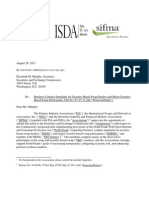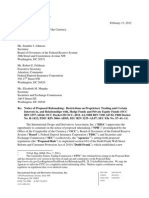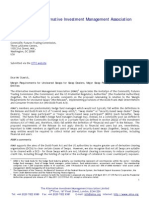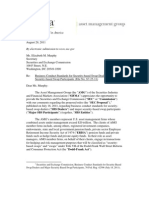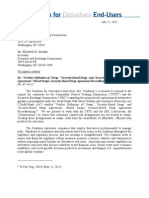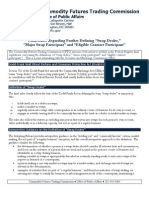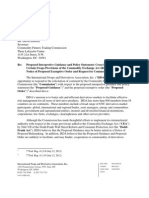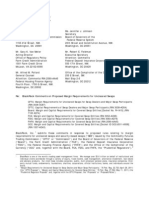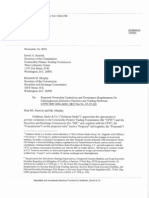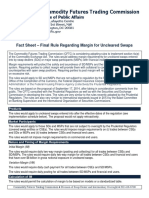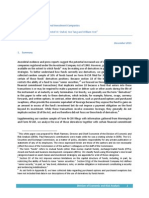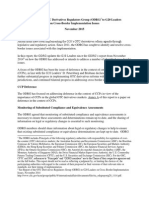Transparency Accountability
Transparency Accountability
Uploaded by
MarketsWikiCopyright:
Available Formats
Transparency Accountability
Transparency Accountability
Uploaded by
MarketsWikiOriginal Title
Copyright
Available Formats
Share this document
Did you find this document useful?
Is this content inappropriate?
Copyright:
Available Formats
Transparency Accountability
Transparency Accountability
Uploaded by
MarketsWikiCopyright:
Available Formats
TRANSPARENCY ACCOUNTABILITY
August 29,2011
Ms. Elizabeth M. Murphy
Secretary
Securities and Exchange Commission
100 F Street, NE
Washington, DC 20549-1090
Re: Business Conduct Standards for Securities-Based Swap Dealers and Major Securities
Based Swap Participants; File Number S7-25-11
Dear Ms. Murphy:
Better Markets, Inc.
1
appreciates the opportunity to comment on the above
captioned proposed rules ("Proposed Rules") of the Securities and Exchange Commission
("Commission"). The Proposed Rules would implement the business conduct standards
applicable to securities-based swap dealers ("SBS Dealers") and major securities-based
swap participants ("Major SBS Participants") (collectively, "SBS Entities"), in accordance
with Section 764 ofthe Dodd-Frank Wall Street Reform and Consumer Protection Act
("Dodd-Frank Act")'
INTRODUCTION
For years, derivatives market participants have been unrestrained by disclosure
obligations or standards of care, and they have often used this unregulated environment to
reap huge profits at the expense of their counterparties, including municipalities,
businesses, and other market professionals. With grossly distorted compensation
incentives, SBS Dealers have created ever more complex products ostensibly customized to
meet client needs, but actually designed to be incomprehensible by anyone other than a
derivatives expert.
Like the proverbial car salesman who understands that the real profit is in the "add
ons and extras" that are poorly understood by the customer, SBS Dealers and Major SBS
Participants have been incentivized to make transactions as complicated and opaque as
possible, deriving greater and greater gains from each layer.
As a result, the history of the derivatives markets is littered with financial disasters
and scandals arising from transactions sold by dealers to clients who never knew or
understood the ramifications of the complex financial instruments they were sold. From
industrial companies like Proctor and Gamble and Metallgeselschaft to financial entities
Better Markets, Inc. is a nonprofit organization that promotes the public in the capital and commodity markets,
including in particular the rulemaking process associated with the Dodd-Frank Act.
1825 K Street, NW, Suite 1080, Washington, DC 20006 (1) 202.618-6464 (1) 202.618.6465 bettermarkets.com
I
Mr. David A. Stawick
Page 2
like AIG and Long-Term Capital Management, enormous sums have evaporated from the
balance sheets of major businesses through these instruments. And the losses to
governmental entities like Orange County, California; Jefferson County, Alabama; the State
of Wisconsin Investment Board; the State of West Virginia; and the Denver school district
have cost taxpayers tens of billions of dollars.
SUMMARY OF COMMENTS
With full knowledge of the many egregious abuses for years in this area, Congress
gave the Commission very broad authority to implement the business conduct standards.
2
Unfortunately, the Proposed Rules fail to take full advantage ofthis authority in the two
areas that are most critical in any effort to raise the standards of conduct in the SBS
markets.
First, the disclosure obligations are too limited in terms of scope, form, and content.
The disclosure provisions will lift the veil of complexity surrounding derivatives only if
they require more complete, timely, and intelligible disclosure of all the risks, costs, and
other material information relating to SBS transactions.
Second, the Proposed Rules fail to establish the best interest standard as the duty
for SBS Entities when they are advising all counterparties, not just Special Entities. While
the suitability and know-your-counterparty provisions in the Proposed Rules will offer
some protections, they fall well short of what the Commission can and must do to truly
safeguard counterparties from predatory behavior in the SBS markets. If an SBS Entity
makes recommendations to counterparties or otherwise provides advice, then they should
be subject to the best interest standard, as developed in the context of the fiduciary duty.
This standard should not be reserved solely for Special Entities.
Uniform application of the stronger standard is highly appropriate based on the now
widely accepted proposition that any market participants who dispense advice regarding
investments must be required to put the interests of their clients above their own. The
need for this higher standard is nowhere more compelling than in the SBS markets, by
virtue of the unique risks and complexities they present. The Commission's failure to adopt
this approach will allow an unacceptable level of exploitation to persist in the SBS markets
for years to come.
Even the Proposed Rules that implement the best interest standard in favor of
special entities, defined to include government agencies, municipalities, and pension funds
("Special Entities"), are laden with limitations and exemptions that are indefensible under
the Dodd-Frank Act. For example, the Proposed Rules include a definition of advisory
activities (which trigger the best interest standard) that is too narrow and inconsistent
with the statutory directive. In addition, the Proposed Rules only apply the best interest
standard to SBS Dealers, not Major SBS Participants. And, without any statutory basis, they
create an exemption that would allow SBS Dealers to act as advisors without being subject
to the best interest standard.
Release at 42397.
I
1B25 K Street. NW, Suite lOBO, Washington, DC 20006 (1) 202.618-6464 (1) 202.618.6465 bettermarkets.com
2
Mr. David A. Stawick
Page 3
Compounding these problems, the Release includes alarmingly inaccurate
statements that appear to equate the best interest standard with suitability. To address
this issue, the Proposed Rules must include a strong and clear definition of the best interest
standard, and the adopting release must correctly delineate the distinction between
suitability and best interest.
Our specific comments on these and other elements of the Proposed Rules include
the following:
The disclosure provisions in the Proposed Rules must be strengthened
with respect to the parties entitled to disclosure, the timing and manner
of disclosure, and the information disclosed.
o The disclosure obligations should apply even when the counterparty is
also an SBS Entity.
o Disclosure should be required at a reasonably sufficient time prior to
the SBS transaction, in writing, and in a clear and intelligible format.
o The Proposed Rules must require disclosure of additional content,
including disaggregated prices and risks, listed hedge equivalents,
scenario analysis, and embedded financing costs.
The Proposed Rules must apply the best interest standard, not merely a
suitability test, whenever an SBS Entity acts as an adviser to a prospective
counterparty.
o Imposing the best interest standard for all advisory activity, not just
advisory activity directed to Special Entities, is consistent with the
general principle that anyone who advises others about financial
instruments should be subject to the fiduciary duty.
o The applicable standard must be applied to both types of SBS Entities.
The Proposed Rules must be strengthened to better protect Special
Entities.
o The Proposed Rules must define the "best interest" standard and the
adopting release must dispel the implication that it is equivalent to a
suitability standard.
o Major SBS Participants should also be subject to the best interest
standard if they act as advisors to Special Entities.
o The Proposed Rules should expand the definition of "advisor" to cover
more than just recommendations.
1825 K Street. NW. Suite 1080, Washington, DC 20006 (1) 202 .618-6464 (1) 202.618.6465 bettermarkets.com
Mr. David A. Stawick
Page 4
o The exemption from the definition of "advisor," applicable when
independent representatives are involved, should be eliminated.
o The definition of "independent representatives" must be strengthened
to eliminate conflicts of interest.
o The Proposed Rules must adopt the stronger standard for determining
when an SBS Entity may no longer rely on information obtained from
independent representatives and others.
o The Proposed Rules must require Major SBS Participants, as well as SBS
Dealers, to disclose the capacity in which they are acting when they
enter SBS transactions with Special Entities.
o The Proposed Rules must narrow the exemption from compliance with
the Special Entity provisions in accordance with the statutory language.
The provisions in the Proposed Rules dealing with Chief Compliance
Officers ("CCOs") should be enhanced with additional measures designed
to ensure the effectiveness and independence of the CCO.
o The Proposed Rules should impose qualification standards on CCOs.
o The Proposed Rules should provide for ceo oversight solely by
independent board members.
o The Proposed Rules should prohibit coercion or other interference with
the ceo.
o The Proposed Rules should require the board to review the ceo's
annual report and either formally approve it or provide separate
comment.
THE DODD-FRANK ACT AND THE PROPOSED RULES
The Dodd-Frank Act imposes three basic types of business conduct standards:
Antifraud prohibitions, disclosure obligations, and standards of care focused specifically on
the duties that SBS Entities owe when they trade with or advise Special Entities.
The Proposed Rules include provisions on all three of the major topics covered in
the Dodd-Frank Act.
3
The Proposed Rules also incorporate some additional measures
J With respect to the antifraud provisions, the Proposed Rules include relatively few new standards applicable to
SBS transactions. Instead, they rely largely on the fact that some of the antifraud provisions relating to business
conduct in the Dodd-Frank Act are self-executing. In addition, the Proposed Rules confirm that they are not
intended to limit or restrict the applicability of other provisions in the securities laws that already prohibit fraud
in securities transactions or in the existing rules and regulations promulgated thereunder. Release at 4240 I.
1825 K Street, NW, Suite 1080, Washington, DC 20006 (1) 202.618-6464 (1) 202.618.6465 bettermarkets.com
Mr. David A. Stawick
Page 5
authorized but not expressly required by the Dodd-Frank Act, including suitability and
know-your-customer standards modeled on SRO rules, as well as pay-to-play provisions.
Finally, the Proposed Rules would implement a separate section of the Dodd-Frank Act that
establishes the duties of CCOs of SBS Entities.
COMMENTS ON PROPOSED RULES
The Disclosure Provisions in the Proposed Rules Must Be Strengthened With Respect
to the Parties Entitled to Disclosure. the Timine: and Manner of Disclosure. and the
Information Disclosed.
The Dodd-Frank Act mandates that the Commission adopt rules requiring SBS
Entities to disclose certain types of information to counterparties in SBS transactions,
including information about the material risks and characteristics of SBS and the material
incentives or conflicts of interest that an SBS Entity has in connection with an SBS
transaction.
4
Effective disclosure obligations are critically important to the creation of a fair and
properly functioning SBS marketplace. Parties that seek to trade in these complex
instruments must have the benefit of full disclosure of all the material terms and risks
associated with SBS transactions, as well as the conflicts of interest and other incentives
that are influencing SBS Entities in their dealings with counterparties. To ensure that the
disclosure regime applicable to SBS transactions is adequate, the Proposed Rules must be
strengthened in numerous important ways.
The Disclosure Obligations Should Apply Even When the Counterparty Is Also an SBS Entity.
The general disclosure requirements under the Proposed Rules would not apply
whenever the counterparty is an SBS Entity, a swap dealer, or a major swap participant.
s
The Release explains that this approach is based primarily on the statutory language of the
Dodd-Frank Act, which parenthetically exempts SBS Entities from the universe of
counterparties that must receive disclosure.
6
This narrow approach is unwarranted. All counterparties, induding SBS Entities,
should be entitled to the disclosures required under the Dodd-Frank Act. As a legal matter,
the statute clearly does not prevent the Commission from extending the benefits of
4 The Release raises a threshold question as to whether the intended beneficiaries of the Proposed Rules should be
pennitted to opt out ofthe protections they receive. Release at 42402. Such an approach must be rejected. As
suggested in the Release, many counterparties will not have a meaningful opportunity to assess whether or not
they should opt out, and they will undoubtedly be pressured by some SBS Entities to make choices that are not in
their best interest. An opt-out provision will only add confusion to an already complex regulatory framework
and create opportunities for market participants to evade compliance with the much- needed business conduct
standards. This will needlessly require the Commission to devote yet more to its limited resources to policing
abuses under the opt-out clause.
5 Release at 42405.
6 Id. The Release also notes that, with respect to the "daily mark," the Commission believes that mandatory
disclosure of this information to an SBS Entity would be unnecessary because it would be independently
available. Id.
------_.- -
1825 K Street. NW. Suite 1080, Washington. DC 20006 (1) 202.618-6464 (1) 202.618.6465 bettermarkets.com
Mr. David A. Stawick
Page 6
disclosure to SBS Entities; it simply does not require the Commission to do so. In addition,
there is no rationale that supports such an exemption. In terms of access to information, a
counterparty does not necessarily have access to all material information regarding the
terms, risks, and conflicts of interest involved in an SBS transaction simply by virtue of
being an SBS Entity.
Nor does the supposed sophistication of an SBS Entity justify depriving it of
mandatory disclosures. First, of course, the levels of sophistication among SBS Entities
vary widely, particularly among Major SBS Participants. Derivatives risk is often difficult to
understand even for sophisticated financial professionals who are fully capable of handling
more conventional investment products. Second, regardless of how sophisticated an SBS
Entity may be, it will not necessarily have access to the information it needs to make
informed decisions about SBS transactions.
A thorough understanding of the risks, costs, and conflicts associated with an SBS
transaction is material information that all counterparties must have access to. Therefore,
an SBS Entity should be entitled to the same information that any other counterparty
receives under the business conduct standards.
An additional benefit of such an approach will be to create a uniform disclosure
system, culture, and practice, not tied to who the counterparty happens to be or other
factors. Such a uniform requirement will reduce costs, confusion, and mistakes, as well as
exploitation of the less knowledgeable and experienced SBS Entities.
Disclosure Should Be Required at a Reasonably Sufficient Time Prior to the SBS Transaction,
in Writing, and in a Clear and Intelligible Format.
The Dodd-Frank Act does not address the timing or manner of the required
disclosures. The Proposed Rules fill these gaps to some degree, but they must go
substantially further to ensure that the required disclosures are meaningful.
The Proposed Rules appropriately require that disclosure be made be/ore an SBS
transaction takes place.
7
This basic requirement is obviously essential to meaningful
disclosure. However, the Proposed Rules should also require disclosure at a reasonably
sufficient time prior to the transaction so that the counterparty has an opportunity to
understand and evaluate the information provided.
8
Disclosure that is too late to be useful
is tantamount to no disclosure at all.
With respect to the manner of disclosure, the Release explains that the Proposed
Rules would afford parties significant "flexibility" and permit a wide range of
communications, including telephone calls.
9
Where disclosure is not made in writing
before the transaction, the Proposed Rules would only require that a contemporaneous
7 Release at 42406.
8 This is the approach adopted by the CFTC. CFTC Rule 23.431 .
9 Release at 42406.
1825 K Street, NW, Suite 1080, Washington, DC 20006 (1) 202.618-6464 (1) 202.618.6465 bettermarkets.com
Mr. David A. Stawick
Page 7
written record be made and provided to the counterparty no later than the trade
acknowledgement. 10
This approach is woefully inadequate and will invite needless errors and abuses.
Allowing merely verbal disclosure prior to an SBS transaction, even with a subsequent
written record, will substantially increase the risk that the disclosure will be erroneous,
incomplete, unclear, or misunderstood. Moreover, it leaves far too much room for abuse,
creating opportunities for unscrupulous SBS Entities to make partial or nonexistent
disclosures without adequate proof of compliance. All of these problems can be mitigated
with a simple and clear rule: all disclosures must be made in writing, either via documents
or electronic transmissions.
Finally, to be comprehensible, all ofthe information subject to the disclosure
requirements must be presented in clear terms, in a format that permits comparison
between derivatives offered by different market participants, and without so much
encumbering detail that recipients ofthe information are overwhelmed and confused. The
Proposed Rules would simply require disclosures to be made "in a manner reasonably
designed to allow the counterparty to assess" the risks, characteristics, and incentives
associated with an SBS transaction. I I This standard is not sufficiently prescriptive.
The Proposed Rules Must Require Disclosure ofAdditional C o n t e n ~ Including Disaggregated
Prices and Risks, Listed Hedge Equivalents, Scenario Analysis, and Embedded Financing Costs.
The substance of the mandatory disclosures under the Proposed Rules must also be
expanded. In their current form, the Proposed Rules largely track the general terms of the
statutory language and they require disclosure of two basic categories of information: (1)
the material risks and characteristics of the SBS, and (2) the material incentives or conflicts
of interest that the SBS Entity may have in connection with the SBS.12 With respect to each
category, the Proposed Rules must require the disclosure of more specific information.
The risks and prices associated with complex transactions must be disclosed in
terms o/their disaggregated components. SBS Entities often recommend complex SBS
with multiple embedded risks, marketing them as customized to meet the needs of the
counterparty. These products typically can be disaggregated into separate constituent
instruments, which are often available in more transparent markets. In disaggregated
form, such complex SBS are much more easily understood.
13
10 Id.
11 Id.
12 Release at 42407-10.
13 The enonnous complexity of derivatives transactions has been the subject of study by some leading economists.
One analysis shows that derivatives generally are so complex that it may be impossible to price them accurately
without unlimited computational power-a characteristic known as "computational intractability." See Sanjeev
Arora, Boaz Barak, Markus Brunnenneier, and Rong Ge, Computational Complexity and Information Asymmetry
in Financial Products (Working Paper) (Oct. 19, 2009), available at
http://www.cs.princeton.edul-rongge/derivative.pdf(incorporatedhereinasiffullysetforth).This article
observes that "designers of financial products can rely on computational intractability to disguise their
information .... [and] can generate extra profits from this hidden infonnation, far beyond what would be
possible in a fully rationale setting." Id. at 1. As noted in the article, one potential remedy for this problem is
1825 K Street. NW, Suite 1080, Washington. DC 20006 (1) 202.618-6464 (1) 202.618.6465 bettermarkets.com
Mr. David A. Stawick
Page 8
In fact, disclosure of the disaggregated components of an SBS transaction is the only
way heterogeneous market participants will be able to compare SBS products on an apples
to-apples basis. It is a critical part of any disclosure regime, and it will significantly reduce
bid and offer spreads and product costs borne by SBS customers in the future.
Moreover, without such disaggregated disclosure, it is difficult to see how anyone
could determine if such an SBS would be suitable.14 Meaningful disclosure in compliance
with the directives of the Dodd-Frank Act must require readily understandable
disaggregated data on each component of an SBS.
Therefore, the Proposed Rules must require SBS Entities to disclose derivatives
risks and prices in disaggregated form so that counterparties can readily compare
alternative transactions and relative risks.
Listed hedge equivalents must be provided to customers. Often, SBS
counterparties are sold esoteric derivatives when conventional, listed instruments could
address their risks almost as precisely as the more complex (and always more expensive)
SBS transaction actually sold. The more esoteric a derivative is, the more difficult it is to
understand both the derivative itself and its pricing. Not coincidentally, the more complex
it is, the more profitable it is for the SBS Entity.
One anecdote captures the dominant role of complexity in the marketing and
profitability of derivatives. The following question was recently asked privately of a very
senior trader at a major hedge fund (who had worked at one of the top 5 investment banks
for many years before his current position): If the compensation was the same for a plain
vanilla swap as it was for a complex swap, what percentage of swaps would be complex
swaps? Without a moment's hesitation, he said almost none.
To combat this contrived and profit-driven complexity in SBS transactions, the
Proposed Rules must require SBS Entities to provide customers the hedge equivalent
alternatives to constructed, esoteric transactions, along with appropriate information on
price correlations.
1s
In addition, an evaluation of the relative liquidity of the proposed esoteric SBS and
the listed hedge equivalent must be provided. The hedge equivalent may, for instance, be
an imperfect hedge for the business risk that the customer is seeking to address through
the SBS transaction. However, the more esoteric SBS, which is a marginally better hedge in
one sense, may be highly illiquid. This illiquidity may well pose risks to the customer that
are significantly worse than the sliver of risk left uncovered by the listed hedge equivalent.
different product design, which would make derivatives less susceptible to seller manipUlation. Id. at 11.
Another remedy is improved disclosure.
14 Similarly, disaggregation will greatly aid the transparency and the usefulness of post-trade data which is to be
disseminated to the regulators and the public.
15 This is directly related to the need for reported swap data to include hedge equivalent pricing for post-trade
analysis by regulators and the pUblic.
1825 K Street, NW, Suite 1080, Washington, DC 20006 (1) 202.618-6464 ( 1) 202.618.6465 bettermarkets.com
Mr. David A. Stawick
Page 9
Finally, if the SBS Entity is not required to post margin to the counterparty under
the esoteric SBS, the difference in potential credit exposure to the counterparty, relative to
the listed hedge equivalent, must be described as well.
Only with all of this information in hand can a counterparty effectively evaluate
whether the esoteric SBS, which is typically much more profitable for the SBS Entity but
riskier than the conventional alternative, is suitable for the counterparty.
The Proposed Rules must require scenario analysis, and that analysis must
include information on liquidity and volatility with respect to the proposed SBS. These
factors, along with counterparty risk, are at the heart of the complexity and unique risks
associated with derivatives. Disclosure of risks and projected scenarios are inadequate
without consideration of these factors.
A fundamental reason that derivatives are difficult for counterparties to understand
and evaluate is that many are traded in highly illiquid markets subject to great price
volatility. Therefore, in both the disclosure and the scenario analyses, information
concerning the liquidity and the volatility of the market for the SBS under consideration
must be provided. Historical liquidity and volatility must be included in the disclosed
information.
Guidance for the scenario analysis must be provided in the Proposed Rules.
Liquidity is generally represented by an assumed holding period for liquidation of a
position upon default. While DCOs often use holding periods of 3 days when calculating
margin for listed and cleared SBS, in the scenario analysis required by the Proposed Rules,
"worst case" scenarios of 5 and 10 days must be required.
Volatility is represented by the confidence interval. The scenario analysis, like the
DCO initial margin calculation, is used to estimate levels of risk based on prudent
assumptions. This is a higher standard than reasonably-expected trading profit or loss.
The confidence interval must be 99 percent at a minimum. These more demanding
parameters are essential to accurately assess the risks posed by illiquid and volatile SBS.
Where credit arrangements are built into SBS through forbearance ofcollateral
posting, the embedded credit and its price must be disclosed separatelyfrom the SBS
price. SBS Entities routinely enter into SBS under the condition that they will not require
the counterparty to post margin or collateral, up to a cap. Contrary to what some market
participants may believe (or have been lead to believe), there is a cost associated with the
extension of credit represented by this forgone margin or collateral,16
16 Professor John Parsons of MIT and Professor Antonio Mello of the University of Wisconsin have written
extensively on the forborne derivatives collateral and the embedded loan. Some ofthese materials can be found
at (and are incorporated herein as if fully set forth):
http: //bettingthebusiness.comJ20 11 /02/ 14/the-coUateral-boogeyman-is-backl
http: //bettingthebusiness.com/20 I 0/ I 0/2S/otc-S-the-co IIatera 1- boogeyman-%E2%80%93 -packagi ng-credit
implicitly-and-explicitly/
bttp: //bettingtbebusiness.comJ20 I 011 0/07/otc-3-the-collateral-boogeyman-%E2%80%93-the-delusion-of
%E2%80%9Cfree%E2%80%9D-credit-from-yow--friendly-neighborbood-derivatives-dealerl
1825 K Street. NW. Suite 1080. Washington. DC 20006 (1) 202.618-6464 (1) 202.618,6465 bettermarkets,com
Mr. David A. Stawick
Page 10
In the common practice oftransacting derivatives bi-Iaterally, there is not one
transaction, but two: an SBS and an extension of credit. If the dealer's counterparty does
not understand this in detail, the transaction cannot be fully understood.
The Proposed Rules must address this issue by specifically requiring disclosure of
the following information:
The amount charged for the extension of credit.
The method used by the SBS Entity to calculate the amount of credit extended,
from time to time.
The effect of the transaction on the capacity of the SBS Entity to extend
incremental credit to the counterparty. 17
These disclosures are also essential for purposes of suitability determinations.
Embedded credit arrangements, and especially the provisions that require immediate cash
funding of margin upon an event such as a credit rating downgrade, are an integral part of
an SBS transaction. It is impossible to determine if an SBS is suitable unless such
embedded transactions are included in the analysis.
The Proposed Rules Must Apply the Best Interest Standard. Not Merely a Suitability
Test. Whenever an SBS Entity Acts as an Advisor to a Prospective Counterparty.
The Proposed Rules would generally require an SBS Dealer making
recommendations to a counterparty to have a reasonable basis for believing that the
recommended SBS or trading strategy is suitable for the counterparty.18 The Dodd-Frank
Act does not expressly address this general standard of conduct, and we therefore
commend the Commission for proactively imposing an explicit duty of care on SBS Entities
when they recommend SBS transactions to any type of potential counterparty. However,
the chosen standard-modeled on the SRO suitability requirement-falls short ofthe level
of care that should be applied in the SBS marketplace.
Imposing the Best Interest Standard for All Advisory Activity, Not Just Advisory Activity
Directed to Special Entities, Is Consistent with the General Principle that Anyone Who Advises
Others About Financial Instruments Should Be Subject to the Fiduciary Duty.
The decision to impose only a suitability standard on SBS Entities recommending
transactions is inconsistent with the fundamental principle that any market participant
that dispenses advice to others about investment products, regardless of their title or
registration status, should be uniformly held to the fiduciary duty. That principle has
http: //bettingthebusiness.coml20 I OJ I 0/ I I lotc-4-the-collateral-boogeyman-%E2%80%93-lobbyists-trot-out-the
free-Iunch/
17 The separate pricing for post trade disclosure, addressed in other proposed rules, is an obvious boon for price
transparency, and the same principles apply here. Furthermore, clarity of pricing will promote competitiveness,
which will ultimately benefit the customers and the public.
18 Release at 42415.
1825 K Street. NW, Suite 1080, Washington, DC 20006 (1) 202.6186464 (1) 202.618.6465 bettermarkets.com
Mr. David A. Stawick
Page 11
finally gained acceptance in the context of broker-dealers who advise retail investors about
securities, and it is embodied in the Dodd-Frank Act provisions authorizing the
Commission to promulgate rules imposing the fiduciary duty on such broker-dealers. The
Commission must seize this opportunity to establish a stronger and better standard of care
in the SBS marketplace as well.
The higher standard of care is nowhere more necessary than in the SBS markets.
Given the complexities and risks inherent in SBS transactions, the only way to ensure fair
treatment of counterparties is to go beyond mere suitability and require any SBS Entity
making recommendations to observe the best interest standard, as it has evolved in the
context of the fiduciary duty.
The Applicable Standard Must Be Applied to Both Types o/SBS Entities.
Whatever standard the Commission determines to adopt, it should apply equally to
Major SBS Participants as well as SBS Dealers. Major SBS Participants do in fact make
recommendations regarding SBS transactions to counterparties, and there is no reason to
exempt them from whatever standard of care governs recommendations and other
advisoryactivity.19 There is no justification for the more limited approach under the
statutory language of the Dodd-Frank Act or its underlying policies. Market participants
engaged in similar activity must be subjected to similar standards of conduct.
The Proposed Rules Must Be Strengthened To Better Protect Special Entities.
The Dodd-Frank Act imposes additional obligations on SBS Entities when they
advise Special Entities or enter into SBS transactions with them. Special Entities are
defined to include federal, state, or municipal agencies; employee benefit plans under
ERISA; and endowment funds. Congress adopted these protections in light of the public
nature of Special Entities, the widespread harm that financial exploitation of Special
Entities can inflict, and their demonstrated vulnerability to abuse.
To adequately implement the special protections intended for Special Entities under
the Dodd-Frank Act, the Proposed Rules must be significantly strengthened.
The Proposed Rules Must Define the "Best Interest" Standard and the Adopting Release Must
Dispel the Implication that It Is Equivalent to a Suitability Standard.
The Dodd-Frank Act requires any SBS Entity that serves as an advisor to a Special
Entity to act in the best interest of that Special Entity?O Further, the statute requires any
SBS Entity that enters into an SBS transaction with a Special Entity to have a reasonable
basis for believing that the Special Entity has its own independent representative, who will
act in the best interest of the Special Entity?l
19 The CFTC rules adopt this broader approach with respect to the suitability standard. CFTC Rule 23.434.
20 Exchange Act 15F(h)(2)(A) and 15F(h)(4), as added by Dodd-Frank Act 764(a).
21 Exchange Act 15F(h)(2)(B) and 15F(h)(5), as added by Dodd-Frank Act 764(a).
1825 K Street, NW, Suite 1080, Washington, DC 20006 (1) 202.618-6464 (1) 202.618.6465 bettermarkets.com
Mr. David A. Stawick
Page 12
These provisions reveal an unmistakable Congressional intent to provide a strong
layer of protection for Special Entities in their dealings with SBS Entities. To ensure that
this standard is not diluted in its application, the Proposed Rules must include a definition
of "best interest." That definition must be at least as strong as the concept of "best interest"
as it has evolved under the fiduciary principles applicable to investment advisors.
A clear definition of "best interest" in the Proposed Rules is essential in light of
multiple statements in the Release suggesting that the best interest standard which
Congress adopted in Section 764 ofthe Dodd-Frank Act is tantamountto "suitability." For
example, the Release states that "the Dodd-Frank Act effectively imposes a suitability
requirement on SBS Dealers that, when acting as advisors, make recommendations to
special entities.,,22 Elsewhere, the Release describes the best interest standard as
"heightened suitability requirement:
m
There is no statutory or policy justification for these suggested interpretations of
the "best interest" standard. Congress's choice of words was not haphazard or accidental.
As noted above, Congress carefully and repeatedly adopted the best interest standard in
the provisions of the Dodd-Frank Act designed to protect Special Entities from abusive
practices in the SBS market. And Congress did so with full awareness of the weaker
suitability standard, an SRO concept developed years ago for broker-dealers making
securities recommendations.
The Commission's gloss on the best interest standard, reflected in the Release, is
simply inconsistent with the statutory language of the Dodd-Frank Act and its underlying
purposes. It is therefore essential to negate any inference that it would be acceptable to
equate the best interest standard with suitability. To accomplish this goal, the Commission
should not only define "best interest" as set forth above, it should also acknowledge in the
adopting release that the best interest standard intended by Congress is a fiduciary concept
that goes well beyond suitability.
Major SBS Participants Should Also Be Subject to the Best Interest Standard If They Act as
Advisors to Special Entities.
The Proposed Rules would apply the best interest standard only to SBS Dealers that
act as advisors to Special Entities. To ensure that the protections afforded to Special
Entities are comprehensive, and to implement the plain language and intent of the Dodd
Frank Act, the Proposed Rules must also apply the best interest standard to any Major SBS
Participant that acts as an advisor to a Special Entity.
The Dodd-Frank Act clearly states that
"A security-based swap dealer or major security-based swap
participant that acts as an advisor to [a] special entity regarding a
22 Release at 42400.
23 Release at 42417.
I
1825 K Street, NW, Suite 1080, Washington, DC 20006 (1) 202.618-6464 (1) 202.618.6465 bettermarkets.com
Mr. David A. Stawick
Page 13
security-based swap shall comply with the requirements of
paragraph (4 ) [which imposes the best interest standard] ....,,24
This statutory language is significant for two reasons. First, it implicitly
acknowledges that Major SBS Participants, as well as SBS Dealers, may act as advisors to
Special Entities. Second, it plainly requires both SBS Dealers and Major SBS Participants to
comply with the best interest standard, whenever they do act as advisors.
The statute creates some ambiguity since the clause in paragraph (4) that imposes
the best interest standard refers only to SBS Dealers?5 However, this ambiguity can and
should be resolved in favor of affording broader, not narrower, protections for Special
Entities. The best way to fulfill Congress's goal of protecting Special Entities is to subject
Major SBS Participants as well as Dealers to the best interest standard if they step into the
role of advisor to a Special Entity. There is no logical basis for subjecting Major SBS
participants and SBS Dealers to different standards of conduct if they are engaged in the
same activity, namely acting as advisors to Special Entities.
Applying the best interest standard to both types of SBS Entities is also consistent
with the Commission's treatment of similar ambiguities in Section 764 of the Dodd-Frank
Act. For example, the Dodd-Frank Act requires SBS Dealers who enter into SBS
transactions with Special Entities to comply with provisions relating to independent
representatives for Special Entities.
26
Even though part of the statutory language refers
only to SBS Dealers, the Release explains that the Proposed Rules will apply those
requirements to Major SBS Participants as well as Dealers, since the clause that details the
independent representative obligations refers to both types of SBS Entities.27
This statutory ambiguity is similar to the one relating to the best interest standard:
one provision references both types of SBS Entities, while a related provision on the same
subject references only one type of SBS Entity. The Commission should resolve both in the
same fashion, by requiring Dealers and Major SBS participants to afford enhanced
protections to Special Entities when they act as advisors.
The Proposed Rules Should Expand the Definition oIl/Advisor" To Cover More than just
Recommendations.
The Proposed Rules would define "act[ing] as an advisor" to mean "recommend [ing]
a security-based swap or a trading strategy that involves use of a security-based swap.',28
This definition is too narrow and must be expanded.
An "advisor" advises, and the plain meaning of the word "advise" is clearly broader
than the word "recommend." The former encompasses not only specific recommendations,
24 Exchange Act lSF(h)(2)(A) and lSF(h)(4), as added by Dodd-Frank Act 764(a) (emphasis added).
25 Release at 42423 n. 196; Exchange Act ISF(h)(4), as added by Dodd-Frank 764(a).
26 Exchange Act lSF(h)(2)(B) and lSF(h)(S), as added by Dodd-Frank Act 764(a).
27 Release at 42426.
28 Release at 42424.
1825 K Street. NW, Suite 1080, Washington, DC 20006 (1) 202.618-6464 (1) 202.618.6465 bettermarkets.com
----------------------------------
Mr. David A. Stawick
Page 14
but also more general information and opinions. Thus, the definition in the Proposed Rules
is inconsistent with the broader statutory mandate.
Adopting such a narrow definition will also undermine the purposes of the Dodd
Frank Act. The Dodd -Frank Act was written to ensure that whenever SBS Entities act as
advisors to Special Entities, those Special Entities receive additional protections against
potential abuses. Those protections include not only the best interest standard, but also
strong antifraud provisions as well. Limiting the definition of "advice" to recommendations
will subject Special Entities to a wide range of advisory activities without the benefits of
those additional protections.
It is easy to imagine scenarios in which an SBS Entity could provide a Special Entity
with large amounts of data, analysis, and opinions that are recommendations in fact, but
not labeled or characterized as such. All of that advice would undoubtedly influence the
investment decisions that Special Entities make. Clearly, in those circumstances, Special
Entities should have the benefit of the additional protections in the statute, as Congress
intended and as the text of the Dodd-Frank Act provided.
As suggested in the Release, a more appropriate definition would be one that
parallels the definition of an investment advisor. Such a definition would encompass
"advising Special Entities as to the value of security-based swaps or as to the advisability of
security-based swaps or trading strategies involving security-based swaps.,,29 The
definition in the Proposed Rules should be expanded accordingly.
The Exemption/rom the Definition o/"Advisor, II Applicable When Independent
Representatives Are InvolvecL Should Be Eliminated.
The Proposed Rules include an exemption that would allow an SBS Entity to act as
an advisor to a Special Entity without being held to the heightened standards set forth in
the Dodd-Frank Act. The exemption would apply where the Special Entity represents in
writing that it will not rely on the recommendations provided by the SBS Entity and that it
will instead rely on advice from a qualified independent representative.
3o
This exemption
is not consistent with the language, structure, or purposes of the Dodd-Frank Act and it
should be deleted from the Proposed Rules.
The provisions in the Dodd-Frank Act governing the duties of SBS Entities that act as
advisors to Special Entities contain no exceptions. The statute unequivocally states that
SBS Entities acting as advisors to Special Entities "shall comply with the requirements of
paragraph (4) with respect to such entity.,,3) Paragraph (4) in turn, which contains the best
29 Release at 42425. Note that the definition of "advisor" in the context of SBS Entities should differ from the
investment advisor definition in at least one important respect. The investment advisor defmition incorporates
the concept of compensation. This should not be included in the Proposed Rules, since a Special Entity should
receive the additional protections whether or not the advice it receives from an SBS Entity is compensated. One
reason for the distinction is the opportunity that SBS Entities have to derive compensation for their advice
indirectly, by entering into SBS transactions with Special Entities as counterparties.
30 Release at 42424.
3 1 Exchange Act 15F(h)(2)(A), as added by Dodd-Frank Act 764(a) (emphasis added).
1825 K Street, NW, Suite 1080, Washington, DC 20006 (1) 202.618-6464 (1) 202.618.6465 bettermarkets.com
Mr. David A. Stawick
Page 15
interest standard and the anti-fraud provisions applicable to advisors, also includes no
exceptions.
32
Obviously, Congress did not intend to create any exemptions that would
allow SBS Entities to dispense advice to Special Entities without being subject to the
heightened standard of conduct.
The case against the exemption in the Proposed Rules is especially strong in light of
other provisions in the Dodd-Frank Act that condition certain activities of SBS Entities on
the involvement of independent representatives. For example, immediately following the
advisor provision is a paragraph allowing SBS Participants to enter into SBS transactions
with Special Entities provided certain conditions are met.
33
Among those conditions is that
the Special Entity counterparty have an independent representative who is knowledgeable
and who will undertake to act in the best interests of the Special Entity?4
Clearly, Congress was mindful of the role that a qualified independent
representative could play in safeguarding the interests of a Special Entity. Therefore,
Congress could have readily incorporated an exemption for advisors that similarly relies
upon the involvement of an independent representative. However, it chose not to do so,
and the Proposed Rules must not overturn this Congressional determination.
Finally, there is no practical justification for the exemption. In effect, what the
industry seeks to gain from the exemption in the Proposed Rules is the right to provide
advice that may not actually be in the best interests of the Special Entity, without any
accountability. The Proposed Rules must not create such a large loophole that is wholly
inconsistent with the language and intent of the Dodd-Frank ACt.
35
The Definition of"Independent Representatives" Must Be Strengthened To Eliminate Conflicts
ofInterest.
In accordance with the Dodd-Frank Act, the Proposed Rules would impose
conditions on the ability of SBS Entities to enter into SBS transactions with Special Entities.
Specifically, they would require the SBS Entity to have a reasonable basis for believing that
the Special Entity had an independent representative who met certain tests.
36
Among other
criteria, the independent representative must be sufficiently knowledgeable to evaluate the
SBS transaction and its risk, and it must undertake a duty to act in the best interests of the
Special Entity?7
32 Exchange Act 15F(h)(4), as added by Dodd-Frank Act 764(a).
33 Exchange Act 15F(h)(5), as added by Dodd-Frank Act 764(a).
34 Id.
35 The exemption is unfounded on another level as well. If the conditions of the exemption are really met, then the
independent representative is supplying whatever advice the Special Entity needs, and there is no reason for the
SBS Entity to be acting as an advisor at all. Conversely, if the Special Entity still seeks advice from the SBS
Entity, notwithstanding the input it receives from its independent representative, then the Special Entity will
presumably rely on that advice to at least some degree and there would no conceivable justification for not
subjecting the SBS Entity to the best interest standard. In short, the exemption is either totally unnecessary or
totally unjustifiable.
36 Release at 42425.
37 Id.
1825 K Street. NW. Suite 1080. Washington. DC 20006 (1) 202.618-6464 (1) 202.618.6465 bettermarkets.com
Mr. David A. Stawick
Page 16
Under this regime, the independent representative plays an enormously important
role in protecting the Special Entity whenever it is entering into transactions with SBS
Entities. Accordingly, it is vital that the independent representative be truly independent
from the SBS Entity involved. However, the Proposed Rules do not accomplish this goal.
For example, the Proposed Rules would define "independent representative" to
include persons who have earned as much as 10 percent oftheir gross revenues from the
SBS Entity over the prior year.38 In addition, the definition would include persons who
were associated persons of the SBS Entity only a year prior to serving as independent
representative for the Special Entity.39
Both of these criteria are far too weak. The Proposed Rules should disqualify
representatives who have received any compensation of any kind, directly or indirectly,
from the SBS entity over the prior year, and the bar on associated person status should be
at least doubled to cover the two prior years. Additionally, representatives and associated
persons must be barred from, directly or indirectly, working for or receiving compensation
from any SBS Entities for a year after they act as an independent representative for any
Special Entity.
Permitting obvious conflicts of interest to persist is not consistent with the law and
it will not adequately protect the interests of Special Entities.
The Proposed Rules Must Adopt the Stronger Standard for Determining When an SBS Entity
May No Longer Rely on Information Obtainedfrom Independent Representatives and Others.
To satisfy the conditions in the Proposed Rules, an SBS Entity would have to
determine that an independent representative satisfied the applicable criteria, including
those relating to knowledge and independence. Much of that information will have to be
derived from representations made by the independent representative or the Special
Entity. The Release seeks comment on two possible approaches for determining when
such representations are no longer reliable and may not be relied upon by an SBS Entity
absent further inquiry.4o This is an important and recurrent issue throughout the Release,
and it arises in multiple situations where SBS Entities must gather information from other
sources to discharge their duties under the Proposed Rules.
The first approach would permit an SBS Entity to rely on a representation from
another person unless it knows that the representation is inaccurate.
41
The second
approach would permit an SBS Entity to rely on a representation from another person
unless the SBS Entity has information that would cause a reasonable person to question
the accuracy of the representation.
42
38 Release at 24246.
39 Id
40 Release at 42426-27.
41 Release at 42427.
42 Id.
1B25 K Street, NW. Suite lOBO, Washington, DC 20006 (1) 202.618-6464 (1) 202.618.6465 bettermarkets.com
Mr. David A. Stawick
Page 17
The second standard is stronger and it is the one that the Commission must adopt
throughout the Proposed Rules as the test for determining whether an SBS Entity may rely
on representations from other persons. It will help ensure that SBS Entities are acting on
reliable information. For example, under the second test, if an SBS Entity received any
information that would cause a reasonable person to question the accuracy of a
representation from a counterparty, it would have a duty "to make further reasonable
inquiry to verify the accuracy of the representation,'.43
In addition, the second test is objective rather than subjective, and it will therefore
be easier to monitor and enforce. Applying this test in all instances when SBS Entities
must gather information to meet their obligations under the Proposed Rules will help
promote full compliance with all of the new standards governing SBS Entities.
The Proposed Rules Must Require Major SBS Participants, as Well as SBS Dealers, to Disclose
the Capacity in Which They Are Acting When They Enter SBS Transactions with Special
Entities.
The Dodd-Frank Act requires both types of SBS Entities to disclose the capacity in
which they are acting when they enter into a transaction with a Special Entity.44 The duties
that SBS Entities owe to Special Entities vary Significantly under the Dodd-Frank Act and
the Proposed Rules. For example, as discussed above, advisors to Special Entities are
subject to a best interest standard. It is therefore important for Special Entities to
understand the capacity in which an SBS Entity is acting before engaging in an SBS
transaction with such an Entity.
However, the Proposed Rules would apply this disclosure obligation only to SBS
Dealers, not Major SBS Participants. This position is based on the same type of statutory
ambiguity that appears in other parts of Section 764 of the Dodd-Frank Act-the general
duty of compliance refers to both types of SBS Entities, but the specific provision at issue
could be narrowly read as referring to only one.
As in those other instances, discussed above, the Proposed Rules should resolve the
issue in favor of the approach that maximizes protections for Special Entities. In this case,
that means requiring Major SBS Participants, as well as SBS Dealers, to disclose the
capacity in which they are acting when they enter SBS transactions with Special Entities.
The Proposed Rules Must Narrow the Exemption/rom Compliance with the Special Entity
Provisions in Accordance with the Statutory Language.
The Dodd-Frank Act provides that the new protections afforded to Special Entities
shall not apply if two conditions are met: (1) the transaction is initiated by the Special
Entity on an exchange or SBS execution facility ("SBS SEF"); and (2) the SBS Entity does not
know the identity of the counterparty to the transaction.
45
43 Id.
44 Exchange Act 15F(h)(5)(A)(ii), as added by Dodd-Frank Act 764(a).
45 Exchange Act 15F(h)(7), as added by Dodd-Frank Act 764(a).
1825 K Street. NW. Suite 1080. Washington. DC 20006 (1) 202.618-6464 (1) 202.618.6465 bettermarkets.com
Mr. David A. Stawick
Page 18
The Proposed Rules implement this exemption by ignoring the first condition
altogether and applying only the second condition.
46
Thus, provided that the SBS Entity
does not know the identity of its counterparty, and the transaction is executed on an SBS
SEF or exchange, then the special protections afforded to Special Entities would not apply
regardless of whether or not the Special Entity initiated the transaction.
This approach impermissibly ignores one of the elements of the exemption
mandated by the statute. By denying the exemption in situations where the SBS Entity
initiates a transaction, the statute intends to ensure that if SBS Entities seek out business
from parties that may be Special Entities, then the SBS Entities must bear the risk that their
counterparties are Special Entities entitled to added protections. The statute thus
incentivizes an SBS Entity to ascertain the identity of its counterparty when it initiates SBS
transactions. The Proposed Rules would eliminate this element of the exemption.
The rationale for the Commission's approach is unconvincing. The Release explains
that "there may be circumstances in which it may be unclear which party, in fact, 'initiated'
the communications that resulted in the parties entering into a security-based swap
transaction.,,47 This ignores the fact that Special Entities are special for a reason and are
entitled to the statutory protections. Potential, occasional lack of clarity is not a valid basis
for cutting back or gutting the conditions for the exemption. SBS Entities must bear the
risk of ambiguity if, on occasion, it is unclear which entity initiated the transaction.
It is incumbent upon the Commission to formulate an appropriate and clear test for
determining when a Special Entity initiates an SBS transaction. To serve the protective
purposes of the statute, the definition must be narrowly framed and it must not encompass
activities that represent initiation of negotiations as opposed to initiation of a transaction.
The possible definition suggested in the Release is too broad for just this reason. The
Release asks whether the exemption might be "limited to situations in which the Special
Entity takes specific steps, such as submitting a request for quote or some other
communication regarding a potential transaction on an exchange or SEF.,,48
This test is not adequate since a mere request for a quote is actually the
commencement of a negotiating process, even if it is conducted over a SEF. This could
certainly result in the type of negotiation between an SBS Entity and a Special Entity in
which the added protections for Special Entities under the Dodd-Frank Act clearly should
apply. Instead, the communication by the Special Entity must be limited to an initiating
communication in which the response would constitute a matched transaction without
need for further action. The SBS Entity would hit or lift the transaction, not negotiate terms.
Above all, the Commission must not, and need not, ignore the statutory requirements for
the exemption.
46 Release at 42421 .
47 Id.
48 Id.
1825 K Street, NW, Suite 1080, Washington, DC 20006 (1) 202.618-6464 (1) 202.618.6465 bettermarkets.com
Mr. David A. Stawick
Page 19
The Provisions in the Proposed Rules Dealine: with Chief Compliance Officers Should
Be Enhanced with Additional Measures Designed to Ensure the Effectiveness and
Independence ofthe CCO.
The Proposed Rules implement the provisions in the Dodd-Frank Act relating to the
appointment and duties of the ceo of an SBS Entity. Although they are generally
appropriate as far as they go, the Proposed Rules should incorporate additional measures
that will help ensure the effectiveness and independence of the CCO.
49
The Proposed Rules Should Impose Qualification Standards on CCOs.
The Proposed Rules should require the ceo to meet competency standards to
ensure that the person has the background and skills appropriate for fulfilling the
responsibilities of the position. These standards should include a lack of disciplinary
history in addition to criteria demonstrating relevant knowledge and experience.
Furthermore, the ceo must not be the general counselor a member of the legal
department of the SBS Entity.
The Proposed Rules Should Provide for CCO Oversight Solely by Independent Board Members.
In light of the pressures that are brought to bear on CCOs, the Proposed Rules must
include a number of provisions to help ensure the independence of the ceo. Greater
reliance on oversight by independent members of the boards of directors is an important
component of these provisions. Those board members are independent from senior
management and are more likely to view compliance as a worthy goal rather than an
obstacle.
Decisions relating to the designation ofthe ceo, the ceo's compensation, material
changes in the ceo's responsibilities, and termination of the ceo should be the sole
responsibility of the independent members of the board acting by majority vote. In
addition, the ceo should have a direct line of reporting to the independent directors or the
audit committee.
The Proposed Rules Should Prohibit Coercion or Other Interference with the CCO.
The Proposed Rules should include a provision explicitly prohibiting any officers,
directors, or employees of an SBS Entity from directly or indirectly taking any action to
coerce, manipulate, mislead, or fraudulently influence the ceo in the performance of his
responsibilities.
49 In other comment letters, we have previously urged the Commission to adopt such additional measures relating
to CCOs. See Comment Letters from Better Markets, Inc., to the Commission dated Jan. 24, 2011 (on regulation
ofSBS swap data repositories, File No. S7-53-l0); Apr. 4, 2011 (on regulation ofSBS swap execution facilities,
File No. S7-06-11); and Apr. 29, 2011 (on clearing house regulation, File No. S7-08-11).
1825 K Street, NW, Suite 1080, Washington, DC 20006 (1) 202.618-6464 (1) 202.618.6465 bettermarkets.com
Mr. David A. Stawick
Page 20
The Proposed Rules Should Require the Board to Review the CCO's Annual Report and Either
Formally Approve It or Provide Comment.
The Proposed Rules would require the CCO to prepare a certified annual report
describing the clearing agency's policies and procedures relating to compliance matters
and further describing its compliance with applicable laws and regulations. The report
must be submitted to the board, the audit committee, and the senior officer ofthe SBS
Entity before being filed with the Commission.
5o
These important provisions should be enhanced to require the board and the audit
committee to review the CCO's report and either approve it or prepare a written statement
of any disagreements they may have. Furthermore, any approvals or objections should
accompany the report when it is filed with Commission.
CONCLUSION
We hope these comments are helpful in your consideration of the Proposed Rules.
~ #I4kv .rlc.f/
Dennis M. Kelleher ,
President & CEO I
Stephen W. Hall
Securities Specialist
Better Markets, Inc.
Suite 1080
1825 K Street, N.W.
Washington, D.C. 20005
(202) 618-6464
www.bettermarkets.com
dkelleher@bettermarkets.com
shall@bettermarkets.com
50 Release at 24236-37.
1825 K Street, NW, Suite 1080, Washington, DC 20006 (1) 202.618-6464 (1) 202.618.6465 bettermarkets.com
You might also like
- Trendline Trading Strategy: Secrets RevealedDocument114 pagesTrendline Trading Strategy: Secrets RevealedMtshidi Kewagamang100% (16)
- Inventory Chapter 19Document68 pagesInventory Chapter 19Brian ShannyNo ratings yet
- By Electronic Submission To WWW - Sec.govDocument30 pagesBy Electronic Submission To WWW - Sec.govMarketsWikiNo ratings yet
- International Swaps and Derivatives Association, IncDocument24 pagesInternational Swaps and Derivatives Association, IncMarketsWikiNo ratings yet
- Via Email and Federal ExpressDocument5 pagesVia Email and Federal ExpressMarketsWikiNo ratings yet
- Jiri KrolDocument5 pagesJiri KrolMarketsWikiNo ratings yet
- Defs QaDocument3 pagesDefs QaMarketsWikiNo ratings yet
- By Electronic Submission To WWW - Sec.govDocument21 pagesBy Electronic Submission To WWW - Sec.govMarketsWikiNo ratings yet
- Via Electronic Mail:: Dcodcmsefgovernance@Cftc - GovDocument6 pagesVia Electronic Mail:: Dcodcmsefgovernance@Cftc - GovMarketsWikiNo ratings yet
- Michael BoppDocument6 pagesMichael BoppMarketsWikiNo ratings yet
- Unknown UnknownDocument11 pagesUnknown UnknownMarketsWikiNo ratings yet
- Bette: Ma KetsDocument4 pagesBette: Ma KetsMarketsWikiNo ratings yet
- Alch 59cookDocument3 pagesAlch 59cookVanessa AbhishekNo ratings yet
- Re: Docket No. OCC-2011-0008/RIN 1557-AD43 Docket No. R-1415 /RIN 7100 AD74 RIN 3064-AD79 RIN 3052-AC69 RIN 2590-AA45Document42 pagesRe: Docket No. OCC-2011-0008/RIN 1557-AD43 Docket No. R-1415 /RIN 7100 AD74 RIN 3064-AD79 RIN 3052-AC69 RIN 2590-AA45MarketsWikiNo ratings yet
- Bank of AmericaDocument113 pagesBank of AmericaMarketsWiki100% (1)
- I. Executive SummaryDocument15 pagesI. Executive SummaryMarketsWikiNo ratings yet
- Commodity Futures Trading Commission: Office of Public AffairsDocument4 pagesCommodity Futures Trading Commission: Office of Public AffairsMarketsWikiNo ratings yet
- MSP Ecp Factsheet FinalDocument7 pagesMSP Ecp Factsheet FinalMarketsWikiNo ratings yet
- Alchemist July 2010Document20 pagesAlchemist July 2010rsaittreyaNo ratings yet
- Dodd-Frank Act Honor ResearchDocument7 pagesDodd-Frank Act Honor ResearchLinh KinNo ratings yet
- Washington: New York 1101 New York Avenue, 8th Floor Washington, DC 20005-4269 P: 202.962.7300 F: 202.962.7305Document14 pagesWashington: New York 1101 New York Avenue, 8th Floor Washington, DC 20005-4269 P: 202.962.7300 F: 202.962.7305MarketsWikiNo ratings yet
- RIN 1557-AD43 Docket ID OCC-2011-0008 RIN 2590-AA43: Financing America's EconomyDocument14 pagesRIN 1557-AD43 Docket ID OCC-2011-0008 RIN 2590-AA43: Financing America's EconomyMarketsWikiNo ratings yet
- Capital Markets: List of SectionsDocument32 pagesCapital Markets: List of SectionsSree Harish HarryNo ratings yet
- OTCDocument20 pagesOTCLameuneNo ratings yet
- Business Conduct Standards For Swap Dealers and Major Swap Participants With CounterpartiesDocument24 pagesBusiness Conduct Standards For Swap Dealers and Major Swap Participants With CounterpartiesMarketsWikiNo ratings yet
- RBC Wealth Management Comment LetterDocument16 pagesRBC Wealth Management Comment LetterMeganLeonhardtNo ratings yet
- Chapter 5Document7 pagesChapter 5Tasebe GetachewNo ratings yet
- Via Electronic Submission:: Release")Document16 pagesVia Electronic Submission:: Release")MarketsWikiNo ratings yet
- Chapter Five The Regulation of Financial Markets and Institutions 5.1. The Nature of Financial System RegulationDocument7 pagesChapter Five The Regulation of Financial Markets and Institutions 5.1. The Nature of Financial System RegulationWondimu TadesseNo ratings yet
- Re: Clearing Agency Standards For Operation and Governance 17 CFR Part 240 (File No. S7-08-11 RIN 3235-AL13)Document4 pagesRe: Clearing Agency Standards For Operation and Governance 17 CFR Part 240 (File No. S7-08-11 RIN 3235-AL13)MarketsWikiNo ratings yet
- 2025 MandateForLeadership CHAPTER-27Document15 pages2025 MandateForLeadership CHAPTER-27'Thon SysadminNo ratings yet
- Re: Proposed Rules On Incentive-Based Compensation Arrangements Release No. 34-64140 File No. S7-12-11Document12 pagesRe: Proposed Rules On Incentive-Based Compensation Arrangements Release No. 34-64140 File No. S7-12-11MarketsWikiNo ratings yet
- Via EmailDocument15 pagesVia EmailMarketsWikiNo ratings yet
- Unknown UnknownDocument13 pagesUnknown UnknownMarketsWikiNo ratings yet
- PPPC AntiTrust Guidelines - 2006Document5 pagesPPPC AntiTrust Guidelines - 2006alex.nogueira396No ratings yet
- Vice President and Senior Counsel Center For Securities, Trust & Investments 202-663-5253Document6 pagesVice President and Senior Counsel Center For Securities, Trust & Investments 202-663-5253MarketsWikiNo ratings yet
- Crowdfunding Regulation SummaryDocument25 pagesCrowdfunding Regulation SummaryAnonymous ukqEbKTNo ratings yet
- Timothy J. Sloan Wells Fargo & CompanyDocument39 pagesTimothy J. Sloan Wells Fargo & CompanyMarketsWikiNo ratings yet
- Via Electronic SubmissionDocument15 pagesVia Electronic SubmissionMarketsWikiNo ratings yet
- Via Electronic Submission To: Comments@Sec - Gov: With A Copy ToDocument10 pagesVia Electronic Submission To: Comments@Sec - Gov: With A Copy ToMarketsWikiNo ratings yet
- AM AlertDocument3 pagesAM AlertH.I.M Dr. Lawiy ZodokNo ratings yet
- s73610 32Document7 pagess73610 32MarketsWikiNo ratings yet
- ManagedfundsDocument5 pagesManagedfundsMarketsWiki100% (1)
- Via Electronic Filing: Re: Incentive-Based Compensation Arrangements, Rel. No. 34-64140 File No. S7-12-11Document6 pagesVia Electronic Filing: Re: Incentive-Based Compensation Arrangements, Rel. No. 34-64140 File No. S7-12-11MarketsWikiNo ratings yet
- Chris YoungDocument17 pagesChris YoungStephen HurstNo ratings yet
- Better Ma Kets: Transparency Accountability OversightDocument9 pagesBetter Ma Kets: Transparency Accountability OversightMarketsWikiNo ratings yet
- Chris Whalen On CDSDocument26 pagesChris Whalen On CDSZerohedge100% (1)
- Assignment No 2 FIN 602Document9 pagesAssignment No 2 FIN 602NadirNo ratings yet
- Melissa MacgregorDocument18 pagesMelissa MacgregorMarketsWikiNo ratings yet
- OTC Derivatives ClearingDocument18 pagesOTC Derivatives ClearingStephen HurstNo ratings yet
- Re: Blackrock Comments On Proposed Margin Requirements For Uncleared SwapsDocument5 pagesRe: Blackrock Comments On Proposed Margin Requirements For Uncleared SwapsMarketsWiki100% (1)
- Dealers") For Their Dealing Activities in Swaps and Security-Based Swaps (Collectively, "Swaps")Document6 pagesDealers") For Their Dealing Activities in Swaps and Security-Based Swaps (Collectively, "Swaps")MarketsWikiNo ratings yet
- C A S G F C R M: Ommittee On GricultureDocument12 pagesC A S G F C R M: Ommittee On GricultureJohn J. LothianNo ratings yet
- 5.6.4 - Regulation BIDocument5 pages5.6.4 - Regulation BIdartbartkunskyNo ratings yet
- Better M Rkets: Transparency Acco NtabilityDocument15 pagesBetter M Rkets: Transparency Acco NtabilityMarketsWikiNo ratings yet
- Washington, DC 20581: Financing America's EconomyDocument14 pagesWashington, DC 20581: Financing America's EconomyMarketsWikiNo ratings yet
- Bai Tap International BankDocument9 pagesBai Tap International BankA14-19 Tấn LộcNo ratings yet
- Iac061418 Remarks by Micah HauptmanDocument10 pagesIac061418 Remarks by Micah HauptmanDavid BriggsNo ratings yet
- New York, New York: "CFTC") "SEC"Document5 pagesNew York, New York: "CFTC") "SEC"MarketsWikiNo ratings yet
- Summary of Stefan Loesch's A Guide to Financial Regulation for Fintech EntrepreneursFrom EverandSummary of Stefan Loesch's A Guide to Financial Regulation for Fintech EntrepreneursNo ratings yet
- Regulation, Compliance and Ethics in Law Firms: Second EditionFrom EverandRegulation, Compliance and Ethics in Law Firms: Second EditionNo ratings yet
- Minute Entry 336Document1 pageMinute Entry 336MarketsWikiNo ratings yet
- CFTC Final RuleDocument52 pagesCFTC Final RuleMarketsWikiNo ratings yet
- 34 77617 PDFDocument783 pages34 77617 PDFMarketsWikiNo ratings yet
- Federal Register / Vol. 81, No. 88 / Friday, May 6, 2016 / Rules and RegulationsDocument6 pagesFederal Register / Vol. 81, No. 88 / Friday, May 6, 2016 / Rules and RegulationsMarketsWikiNo ratings yet
- Eemac022516 EemacreportDocument14 pagesEemac022516 EemacreportMarketsWikiNo ratings yet
- Federal Register / Vol. 81, No. 55 / Tuesday, March 22, 2016 / NoticesDocument13 pagesFederal Register / Vol. 81, No. 55 / Tuesday, March 22, 2016 / NoticesMarketsWikiNo ratings yet
- Commodity Futures Trading Commission: Vol. 80 Wednesday, No. 246 December 23, 2015Document26 pagesCommodity Futures Trading Commission: Vol. 80 Wednesday, No. 246 December 23, 2015MarketsWikiNo ratings yet
- Via Electronic Submission: Modern Markets Initiative 545 Madison Avenue New York, NY 10022 (646) 536-7400Document7 pagesVia Electronic Submission: Modern Markets Initiative 545 Madison Avenue New York, NY 10022 (646) 536-7400MarketsWikiNo ratings yet
- Douglas C I FuDocument4 pagesDouglas C I FuMarketsWikiNo ratings yet
- Commodity Futures Trading Commission: Office of Public AffairsDocument2 pagesCommodity Futures Trading Commission: Office of Public AffairsMarketsWikiNo ratings yet
- 2015-10-22 Notice Dis A FR Final-RuleDocument281 pages2015-10-22 Notice Dis A FR Final-RuleMarketsWikiNo ratings yet
- Commodity Futures Trading Commission: Office of Public AffairsDocument2 pagesCommodity Futures Trading Commission: Office of Public AffairsMarketsWikiNo ratings yet
- Commodity Futures Trading Commission: Office of Public AffairsDocument3 pagesCommodity Futures Trading Commission: Office of Public AffairsMarketsWikiNo ratings yet
- Daniel Deli, Paul Hanouna, Christof W. Stahel, Yue Tang and William YostDocument97 pagesDaniel Deli, Paul Hanouna, Christof W. Stahel, Yue Tang and William YostMarketsWikiNo ratings yet
- Commodity Futures Trading Commission: Office of Public AffairsDocument5 pagesCommodity Futures Trading Commission: Office of Public AffairsMarketsWikiNo ratings yet
- Odrgreportg20 1115Document10 pagesOdrgreportg20 1115MarketsWikiNo ratings yet
- 34 76474 PDFDocument584 pages34 76474 PDFMarketsWikiNo ratings yet
- Historical Background of IBBLDocument5 pagesHistorical Background of IBBLSISkobirNo ratings yet
- Nature and Environment of AccountingDocument21 pagesNature and Environment of AccountingJeon JeonNo ratings yet
- 9-Gomez Vs CA - Full CaseDocument11 pages9-Gomez Vs CA - Full CasepreiquencyNo ratings yet
- Niantic v. Global++ - Mot. For PIDocument28 pagesNiantic v. Global++ - Mot. For PIGrahamNo ratings yet
- CFA India Society - US - 3 SepDocument22 pagesCFA India Society - US - 3 SepTina PhilipNo ratings yet
- Chapter 9: Wholesaling and Physical DistributionDocument3 pagesChapter 9: Wholesaling and Physical DistributionReid Aileen Ivorie Villalobos100% (1)
- SKMSDocument12 pagesSKMSuserdz7770No ratings yet
- Synopsis Dawarfootwear IndustryDocument9 pagesSynopsis Dawarfootwear IndustryAyush TiwariNo ratings yet
- F1099oid 2018Document9 pagesF1099oid 2018joe100% (2)
- (Springer Briefs in Finance) Bosia, Nicola - Hofmann, Erik - Strewe, Urs Magnus-Supply Chain Finance and Blockchain Technology - The Case of Reverse Securitisation (2018)Document96 pages(Springer Briefs in Finance) Bosia, Nicola - Hofmann, Erik - Strewe, Urs Magnus-Supply Chain Finance and Blockchain Technology - The Case of Reverse Securitisation (2018)aditriadi100% (6)
- Fabm ReveiwerDocument10 pagesFabm ReveiwerClarisse De VeraNo ratings yet
- Malayang Manggagawa Sa ESSO (PFPW) vs. ESSO Standard Eastern, Inc., G.R. No. L-24224, July 30, 1965Document8 pagesMalayang Manggagawa Sa ESSO (PFPW) vs. ESSO Standard Eastern, Inc., G.R. No. L-24224, July 30, 1965Mark Joshua VejeranoNo ratings yet
- Architectural Services Bid ProposalDocument3 pagesArchitectural Services Bid Proposalvince de JesusNo ratings yet
- FX Trader Magazine July September 2015Document88 pagesFX Trader Magazine July September 2015Ahmad HailmeNo ratings yet
- MDB ProgramDocument1 pageMDB Programwill_rohitNo ratings yet
- Problems and Prospects of Women Entrepreneurship: Bangladesh PerspectiveDocument8 pagesProblems and Prospects of Women Entrepreneurship: Bangladesh PerspectiveMD. Mahin AbdullahNo ratings yet
- PMP Formula Pocket GuideDocument1 pagePMP Formula Pocket Guidejindalyash1234100% (2)
- Learning Curve NotesDocument3 pagesLearning Curve NotesFellOut XNo ratings yet
- Acct 101 S1 2023 Week 8 Tutorial SolutionsDocument4 pagesAcct 101 S1 2023 Week 8 Tutorial SolutionsXixi MinNo ratings yet
- ROYAL ICE CREAM P. MBA Porject Report Prince DudhatraDocument35 pagesROYAL ICE CREAM P. MBA Porject Report Prince DudhatrapRiNcE DuDhAtRaNo ratings yet
- Lecture 5Document14 pagesLecture 5Saadia MobeenNo ratings yet
- Project Management Processes-Ch3Document88 pagesProject Management Processes-Ch3nihaj100% (1)
- Wilkerson Case Study FinalDocument5 pagesWilkerson Case Study Finalmayer_oferNo ratings yet
- JanuaryDocument4 pagesJanuaryalihassan459001No ratings yet
- Day Old Chicken Rearing Business PlanDocument9 pagesDay Old Chicken Rearing Business PlanshmekebeNo ratings yet
- Lesson SAP SD FullDocument68 pagesLesson SAP SD FullGlender AlbertoNo ratings yet
- JIT Kaizen 1666650411Document300 pagesJIT Kaizen 1666650411You ElNo ratings yet
- It-Docu Academic Project - Yabut-Tayco - FinalDocument78 pagesIt-Docu Academic Project - Yabut-Tayco - FinalJared Gabriel Sangalang TaycoNo ratings yet


